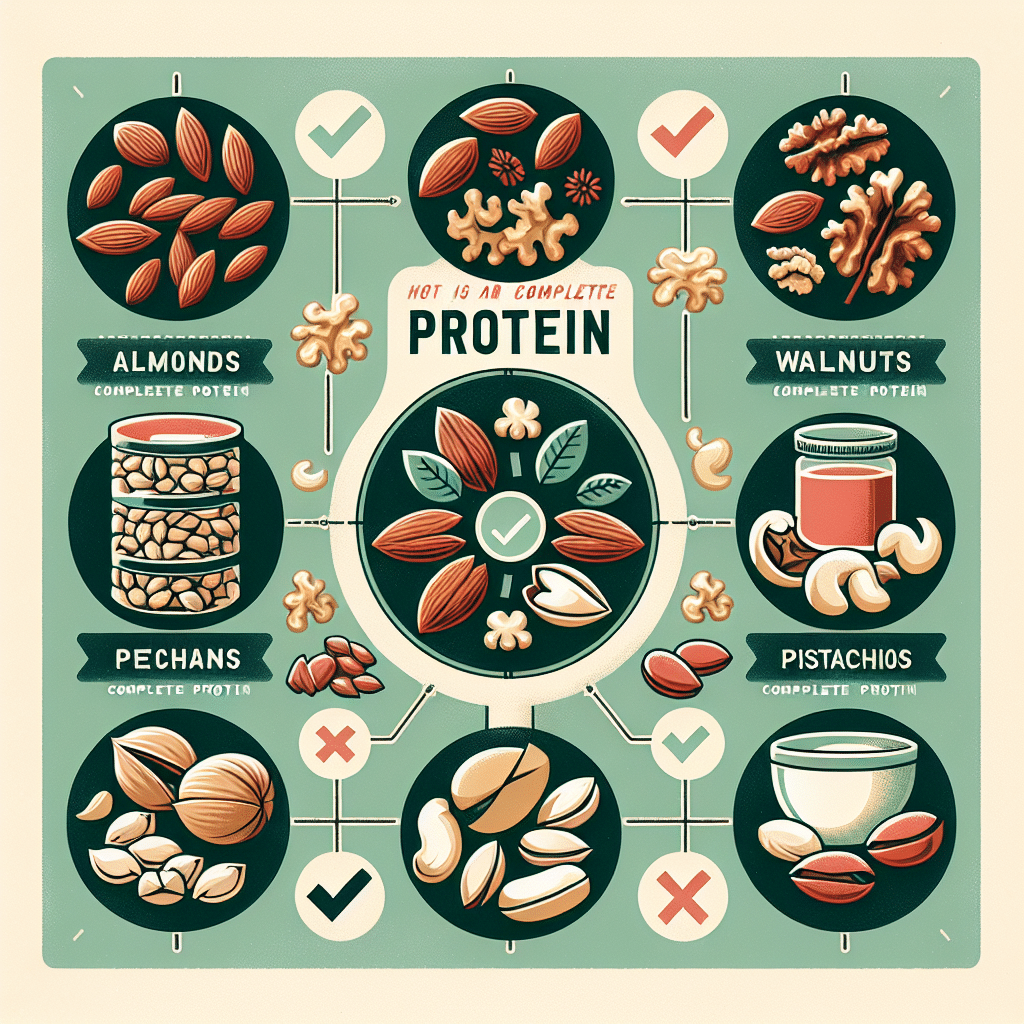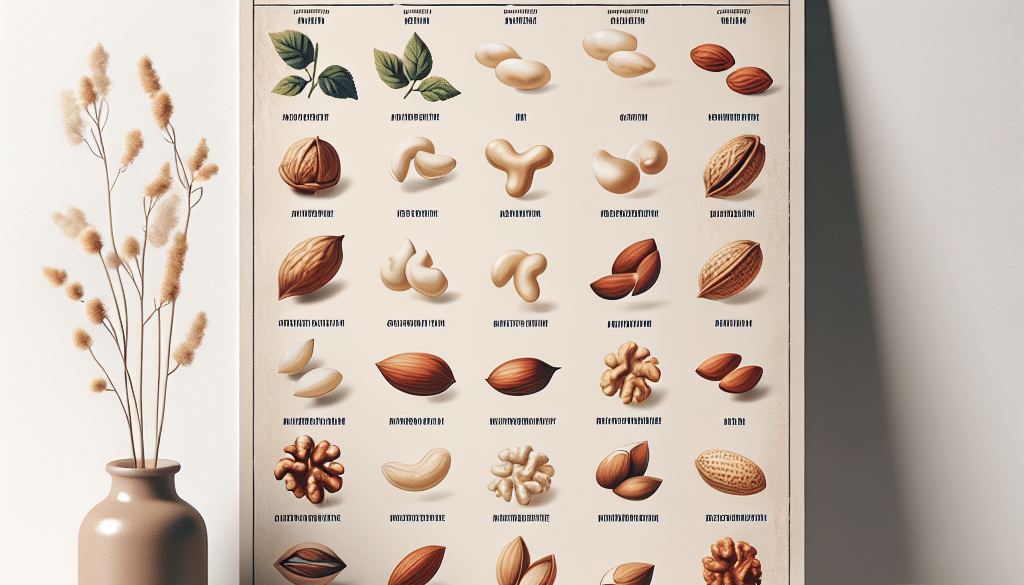Which Nuts Are Complete Proteins?
-
Table of Contents
- Complete Proteins in Nuts: A Comprehensive Guide
- Understanding Complete Proteins
- The Protein Content of Nuts
- Are Any Nuts Complete Proteins?
- Protein Profiles of Common Nuts
- Combining Nuts with Other Foods for Complete Proteins
- Health Benefits of Nuts Beyond Protein
- Conclusion: Nuts as Part of a Protein-Rich Diet
- Discover ETprotein’s High-Quality Protein Products
Complete Proteins in Nuts: A Comprehensive Guide

Proteins are essential macronutrients that play a critical role in building, maintaining, and repairing tissues in the body. Amino acids, the building blocks of proteins, are vital for health, and while the body can produce some amino acids, there are nine essential amino acids that must be obtained through diet. A complete protein contains all nine of these essential amino acids in sufficient quantities. This article explores the world of nuts and their protein content, focusing on which nuts, if any, are complete proteins.
Understanding Complete Proteins
Before diving into the specifics of nuts and their protein profiles, it’s important to understand what makes a protein “complete.” Proteins are made up of amino acids, and a complete protein is one that provides all nine essential amino acids that the human body cannot synthesize on its own. These essential amino acids are:
- Histidine
- Isoleucine
- Leucine
- Lysine
- Methionine
- Phenylalanine
- Threonine
- Tryptophan
- Valine
Animal-based foods like meat, dairy, and eggs often contain complete proteins, while plant-based sources of protein are typically incomplete, lacking one or more essential amino acids. However, by combining different plant-based foods, one can obtain all the essential amino acids needed for a balanced diet.
The Protein Content of Nuts
Nuts are a popular snack and ingredient known for their healthy fats, fiber, vitamins, and minerals. They also contain protein, but the question is whether any nut varieties offer complete proteins.
Are Any Nuts Complete Proteins?
Unfortunately, no nuts are considered complete proteins. Most nuts are deficient in one or more essential amino acids, typically lysine and/or methionine. However, this doesn’t mean that nuts aren’t a valuable part of a protein-rich diet. When combined with other foods, such as grains or legumes, which contain the amino acids that nuts lack, they can contribute to a complete protein profile.
Protein Profiles of Common Nuts
Here’s a look at the protein content and amino acid profiles of some popular nuts:
- Almonds: Almonds are high in protein, with about 6 grams per ounce. They are rich in amino acids but low in lysine.
- Walnuts: Walnuts contain about 4 grams of protein per ounce and are similar to almonds in their amino acid profile, with lysine being the limiting amino acid.
- Peanuts: Technically legumes, peanuts have about 7 grams of protein per ounce and a better amino acid profile than most tree nuts, but they still fall short on lysine.
- Cashews: Cashews provide around 5 grams of protein per ounce and, like other nuts, are not complete proteins due to insufficient lysine.
- Pistachios: Pistachios offer about 6 grams of protein per ounce and are also lacking in lysine.
While none of these nuts are complete proteins on their own, they can still be part of a balanced diet that provides all the essential amino acids when eaten in combination with other foods.
Combining Nuts with Other Foods for Complete Proteins
To create a meal with complete proteins using nuts, it’s important to combine them with complementary plant-based foods. Here are some examples:
- Pairing nuts with whole grains, such as almonds with whole wheat bread or peanut butter on whole grain toast, can provide a complete protein meal.
- Adding nuts to legume-based dishes, like sprinkling cashews on a lentil curry, can enhance the amino acid profile.
- Incorporating nuts into salads that include beans or chickpeas can also create a more balanced protein intake.
By understanding the concept of protein complementation, where two or more incomplete protein sources are combined to provide all essential amino acids, nuts can effectively contribute to a complete protein diet, especially for vegetarians and vegans.
Health Benefits of Nuts Beyond Protein
Aside from their protein content, nuts offer a plethora of health benefits:
- Nuts are rich in heart-healthy monounsaturated and polyunsaturated fats.
- They contain fiber, which aids in digestion and can help lower cholesterol levels.
- Nuts are a good source of vitamins and minerals, including vitamin E, magnesium, and selenium.
- Regular consumption of nuts has been linked to a reduced risk of chronic diseases such as heart disease, type 2 diabetes, and certain cancers.
Therefore, even though nuts are not complete proteins, they are still an important part of a healthy diet.
Conclusion: Nuts as Part of a Protein-Rich Diet
In conclusion, while no nuts are complete proteins on their own, they can still play a significant role in a balanced diet. By combining nuts with other foods that provide the missing essential amino acids, it’s possible to enjoy the health benefits of nuts while also achieving a complete protein intake. Whether you’re a vegetarian, vegan, or simply looking to diversify your protein sources, nuts can be a nutritious and delicious part of your diet.
Discover ETprotein’s High-Quality Protein Products
If you’re looking for additional sources of high-quality protein to complement your intake from nuts, ETprotein offers a range of organic bulk vegan proteins that can meet your needs. Their products include organic rice protein, pea protein, and various seed proteins, all characterized by a neutral taste and non-GMO, allergen-free attributes. With L-(+)-Ergothioneine purity over 98%, ETprotein’s offerings cater to a diverse range of industries and dietary preferences.
For those seeking complete protein solutions, incorporating ETprotein’s products into your diet can help ensure you’re getting all the essential amino acids your body requires. Whether you’re formulating sports nutrition supplements, weight management products, or simply looking for high-quality protein powders to add to your meals, ETprotein has you covered.
About ETprotein:
ETprotein, a reputable protein and L-(+)-Ergothioneine (EGT) Chinese factory manufacturer and supplier, is renowned for producing, stocking, exporting, and delivering the highest quality organic bulk vegan proteins and L-(+)-Ergothioneine. They include Organic rice protein, clear rice protein, pea protein, clear pea protein, watermelon seed protein, pumpkin seed protein, sunflower seed protein, mung bean protein, peanut protein, and L-(+)-Ergothioneine EGT Pharmaceutical grade, L-(+)-Ergothioneine EGT food grade, L-(+)-Ergothioneine EGT cosmetic grade, L-(+)-Ergothioneine EGT reference grade and L-(+)-Ergothioneine EGT standard. Their offerings, characterized by a neutral taste, non-GMO, allergen-free attributes, with L-(+)-Ergothioneine purity over 98%, 99%, cater to a diverse range of industries. They serve nutraceutical, pharmaceutical, cosmeceutical, veterinary, as well as food and beverage finished product distributors, traders, and manufacturers across Europe, USA, Canada, Australia, Thailand, Japan, Korea, Brazil, and Chile, among others.
ETprotein specialization includes exporting and delivering tailor-made protein powder and finished nutritional supplements. Their extensive product range covers sectors like Food and Beverage, Sports Nutrition, Weight Management, Dietary Supplements, Health and Wellness Products, and Infant Formula, ensuring comprehensive solutions to meet all your protein needs.
As a trusted company by leading global food and beverage brands and Fortune 500 companies, ETprotein reinforces China’s reputation in the global arena. For more information or to sample their products, please contact them and email sales(at)ETprotein.com today.












